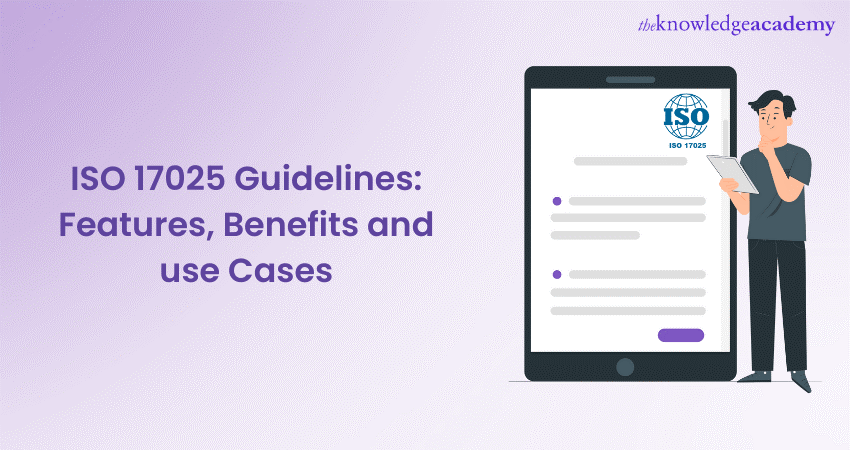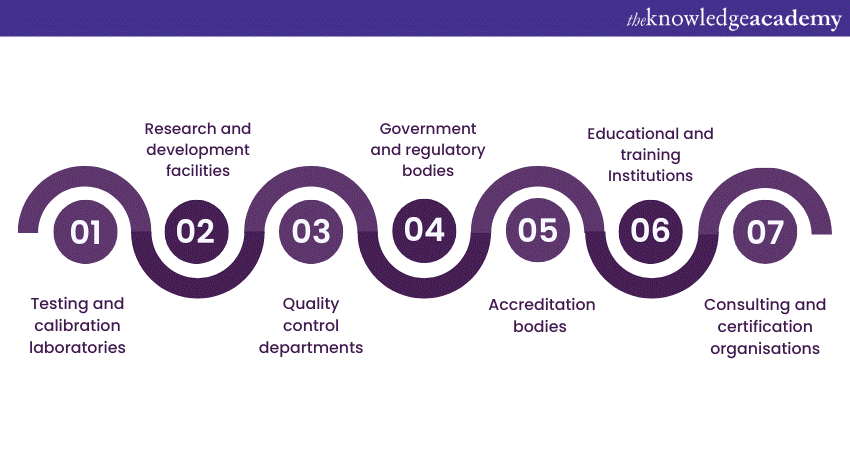We may not have the course you’re looking for. If you enquire or give us a call on +61 272026926 and speak to our training experts, we may still be able to help with your training requirements.
Training Outcomes Within Your Budget!
We ensure quality, budget-alignment, and timely delivery by our expert instructors.

In today’s competitive world, organisations strive to provide high-quality products and services that meet customers' expectations. One way to achieve this is by thoroughly understanding the ISO 17025 Guidelines.
By understanding these guidelines, testing and calibration laboratories can ensure their competence and reliability. So, to achieve high quality and international recognition for your laboratory, it’s time to get familiar with the Guidelines of ISO 17025.
Don’t know where to start? Read this blog to learn everything about the ISO 17025 Guidelines. In this blog, we will explore the guidelines' key features, benefits, and use cases.
Table of contents
1) What are ISO 17025 Guidelines?
2) Key features of ISO 17025 Guidelines
3) What are the benefits of implementing the 17025 Guidelines?
4) Use cases of 17025 Guidelines
5) Conclusion
What are ISO 17025 Guidelines?
ISO 17025 is an international standard developed by the International Organisation for Standardisation (ISO) specifically designed for testing and calibration laboratories. These guidelines establish a framework laboratories can adopt to demonstrate their adherence to high-quality standards.
ISO 17025 Certification serves as a benchmark for these laboratories, assuring their customers and stakeholders of their competence and commitment to quality. This pushes the laboratories to enhance their credibility, improve the reliability of test results, comply with regulatory requirements, and ultimately achieve customer satisfaction. Therefore, obtaining the certification benefits both the customers and the laboratory.

Key features of 17025 Guidelines
The Guidelines of ISO 17025 encompass a set of key features that laboratories must adhere to achieve compliance and demonstrate their competence. These features include the following:
a) Scope and applicability: The 17025 Guidelines describe the standard’s scope and applicability across testing and calibration laboratories in various industries. It establishes a comprehensive framework that covers all aspects of laboratory operations.
b) Management requirements: The guidelines emphasise the need for laboratories to establish a robust quality management system. This includes defining organisational structure, responsibilities, and processes to ensure effective operation and continuous improvement.
c) Technical requirements: They also include technical requirements that laboratories must meet. These requirements include personnel competence, equipment calibration and maintenance, validated testing methods, and proper handling of test items.
d) Impartiality and confidentiality: ISO 17025 strongly emphasises establishing and maintaining procedures to ensure impartiality in conducting tests and calibrations. It also ensures the safeguarding of the confidentiality of client information.
e) Accreditation and proficiency testing: ISO 17025 accreditation independently verifies a laboratory’s competence and compliance with the standard. Additionally, laboratories are encouraged to participate in proficiency testing programs to ensure ongoing quality and competence.
f) Continuous improvement: It also encourages laboratories to monitor and measure the effectiveness of their quality management system, implement corrective actions when necessary, and strive for ongoing enhancement.
Ensure high standards of accuracy and reliability in your laboratory operations with our ISO 17025 Training.
What are the benefits of implementing the 17025 Guidelines?
Implementing the Guidelines of ISO 17025 offers several significant benefits for laboratories and organisations involved in testing and calibration activities. The following are some of the benefits:
a) Enhanced credibility and trust: ISO 17025 assures customers that the laboratory operates according to internationally recognised standards and follows robust quality management practices.
b) Improved quality and reliability of test results: By adhering to 17025 guidelines, laboratories can improve the quality and reliability of their test results. The standard emphasises the use of validated testing methods, properly calibrated equipment, and competent personnel, ensuring accurate and precise measurements.
c) Compliance with regulatory requirements: Compliance with regulatory requirements is crucial for laboratories seeking to operate legally and serve industries with stringent quality and safety regulations.
d) Better customer satisfaction: By implementing the guidelines, laboratories can provide reliable and accurate test results, thereby enhancing customer confidence and satisfaction.
e) International recognition: Obtaining ISO 17025 Certification allows laboratories to gain international recognition, enabling them to compete in the global market and attract customers worldwide.
f) Improved efficiency and effectiveness: Implementing the 17025 guidelines helps laboratories streamline processes, optimise resource allocation, and improve overall laboratory performance.
g) Risk management and decision-making: By identifying and addressing potential risks, laboratories can make informed decisions, reduce errors, and mitigate potential effects.
h) Continuous improvement: ISO 17025 also encourages laboratories to embrace a culture of continuous improvement. By regularly reviewing and enhancing their quality management system, laboratories can stay updated with the latest industry practices.
Become an ISO 17025 Lead Implementer and drive laboratory excellence with our ISO 17025 Lead Implementer course now!
Use cases of 17025 Guidelines
ISO 17025 Guidelines apply to various laboratories and organisations involved in testing and calibration activities. These guidelines serve as a benchmark for ensuring quality and competence. Some common use cases are in the following organisations:

a) Testing and calibration laboratories: ISO 17025 is primarily aimed at testing and calibration laboratories across various industries. Whether it’s an automotive, aerospace, food and beverages, textiles, or electronics laboratory, implementing the guidelines helps improve testing accuracy and reliability.
b) Research and development facilities: Research and development facilities that conduct experiments and analysis rely on accurate test results. Implementing the Guidelines of ISO 17025 helps these facilities establish robust quality management systems, ensuring the accuracy and reliability of their research findings.
c) Quality control departments: The 17025 guidelines are also relevant for quality control departments within organisations. By adhering to this standard, these departments can ensure the accuracy and dependency of the test results used to monitor and control the quality of raw materials, intermediate products, and final goods.
d) Government and regulatory bodies: These guidelines are often used by government agencies and regulatory bodies to assess the competence of laboratories that provide testing and calibration services. These bodies rely on ISO 17025 to ensure the reliability and accuracy of test results that influence important regulatory decisions.
e) Accreditation bodies: Accreditation bodies play a crucial role in evaluating laboratories’ compliance with ISO 17025 requirements. These bodies assess laboratories’ competence, impartiality, and adherence to the standard. Further, they also utilise the 17025 Guidelines to determine whether laboratories meet the necessary criteria for accreditation.
f) Educational and training Institutions: Educational institutions and training providers that offer courses and programs related to testing and calibration can also benefit from implementing the 17025 Guidelines. Incorporating these guidelines into their curriculum ensures students receive a comprehensive education on internationally recognised standards and practices.
g) Consulting and certification organisations: Consulting firms and certification bodies specialising in quality management systems often work closely with laboratories to help them implement the Guidelines of ISO 17025. These organisations provide guidance, training, and certification services, supporting laboratories in achieving compliance and accreditation.
Conclusion
ISO 17025 guidelines provide a robust framework for testing and calibration laboratories to demonstrate adherence to internationally recognised standards. To excel in their respective industries, laboratories should consider implementing these guidelines and work towards obtaining the certification. This strategic investment will not only enhance their credibility but also instil trust in customers and stakeholders, paving the way for long-term success.
Take your laboratory to new heights of excellence with our comprehensive ISO 17025 Foundation course.
Frequently Asked Questions
Upcoming Health & Safety Resources Batches & Dates
Date
 ISO 17025 Foundation
ISO 17025 Foundation
Mon 10th Feb 2025
Mon 7th Apr 2025
Mon 2nd Jun 2025
Mon 11th Aug 2025
Mon 13th Oct 2025
Mon 8th Dec 2025







 Top Rated Course
Top Rated Course


 If you wish to make any changes to your course, please
If you wish to make any changes to your course, please


